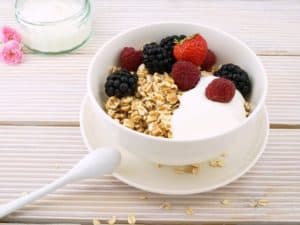Cream Cheese Nutrition Facts and the Best Cream Cheese Substitute
Cream cheese has been a staple in American kitchens since the late 19th century. Aside from being a ubiquitous breakfast food throughout the country, cream cheese is also a key ingredient in many dips and baked dishes. Unfortunately, most cream cheese products currently sold on the market are high in fats, which is why thousands are opting for cream cheese substitutes as a healthier option.
Cream Cheese Overview
Cream cheese is a dairy product made from cow’s milk and cream with additional ingredients added as stabilizers in industrial production. In the United States, cream cheese must contain at least 33% milkfat with a moisture content of 55% or less. Regular cream cheese is sold in the dairy section of most grocery stores in a bar form or in small tubs.
The most well-known brand is Philadelphia Cream Cheese, which traces its roots all the way back to the 1870s. Other popular brands include Arla Cream Cheese, Daiya Cream Cheese, and Organic Valley Cream Cheese. Cream cheese products are available in low-fat, full fat, and light presentations. Most stores also carry cream cheese in a wide array of flavors such as strawberry, honey pecan, chive, and onion.
Cream cheese can be used as a dip for pita chips and similar snacks, though most people in America are familiar with cream cheese as a spread for bread such as bagels. Cream cheese is particularly popular in Jewish American cuisine, where it is known as a “schmear.”

Is Cream Cheese Healthy?
Even though cream cheese is often considered a healthier option than butter, that is not always the case. In fact, the calories in some varieties of cream cheese might be higher than the number found in butter. So, does that mean cream cheese is bad for you?
Not necessarily. Like other foods high in fats, the key to avoiding any risks is to consume these foods in moderation. If you are comparing cream cheese to butter or other spreads, you should take the following into consideration:
Calories in Cream Cheese
A serving of regular Philadelphia or Arla Cream Cheese contains around 50 calories which are about half the caloric content of a serving of butter. It’s important to note that flavored cream cheese, particularly the sweet, fruity kinds, has a higher calorie and sugar count.
But no one eats cream cheese by itself, right? So, how many calories are in a bagel with cream cheese?
A plain bagel contains anywhere from 230 to 280 calories, which means a plain bagel with a serving of cream cheese can contain over 300 calories. For a healthier alternative, consider bagels with a reduced-calorie count.
Fats in Cream Cheese
Like other dairy products, most cream cheese products on the market are high in saturated fats. According to the American Heart Association, eating foods that contain saturated fats can raise cholesterol levels in your blood. In turn, this may lead to an increased risk of heart disease and stroke.
Professionals recommend replacing foods high in saturated fats with foods containing monounsaturated and polyunsaturated fats, which are considered “healthy fats.” Making this change in your diet can reduce your risk of heart disease.
Carbs in Cream Cheese
Generally, regular cream cheese contains a few carbs. While one serving of regular cream cheese offers less than one gram, other types of flavored cream cheese typically have more carbs per serving. For example, brown sugar-flavored cream cheese contains 4 grams of carbs, while strawberry cream cheese has around 2.5 grams.
If you are avoiding carbs, regular, unflavored cream cheese is your best option–as long as you are not pairing it with bagels which have almost 50 grams of carbohydrates per unit. Try replacing bagels for low carbs foods like pita chips, which contain about half the carbs.
Protein in Cream Cheese
Unlike other types of cheese, cream cheese does not offer much in the protein department. One serving of regular cream cheese has less than one gram of protein, so if you are looking to bulk up, switch to a protein-rich alternative like yogurt or ricotta cheese.
Cream Cheese Nutrients
Cream cheese is not necessarily rich in nutrients, though it does provide some vitamins and minerals. A tablespoon of cream cheese has a small amount of vitamin A, vitamin K, folate, and choline. You will also benefit from calcium, phosphorus, sodium, and potassium.
Healthy Cream Cheese Substitutes
Even though cream cheese is not the most nutritious of foods, it doesn’t mean you should eliminate it from your life. However, if you are trying to eat healthier or lose weight, limiting the amount of cream cheese in your diet or finding a substitute for cream cheese, is probably a good idea.
Cashew Cream Cheese
If you are vegan or allergic to dairy products, many of these cream cheese substitutes are also suitable for you. For example, cashew cream cheese provides a thick and creamy dairy-free substitute. While not as sweet as typical cream cheese, if you are making homemade cream cheese with cashews, you can add apple cider vinegar, vanilla extract, herbs, or spices for extra flavor.
Plain Greek Yogurt
In terms of softness and appearance, plain greek yogurt is similar to regular cream cheese. To achieve a thicker consistency, place it in a dry, clean cheesecloth and refrigerate it overnight. For a better tasting cream cheese substitute, you can add chopped onions, carrots, and other ingredients.
Make sure to use the plain variety of Greek yogurt, which is available in most grocery stores. Plain greek yogurt benefits your digestive tract and your bones, making it a much healthier alternative than regular cream cheese.

Coconut Cream Cheese
If you are allergic to nuts and dairy, this nut-free, non-dairy cream cheese is the way to go. Made with coconut milk and coconut butter, this cream cheese alternative has a delicious sweet taste that makes it perfect for frosting and dessert dishes.
Tofu Cream Cheese
This cream cheese substitute is made with silken tofu, lemon juice, vinegar, sugar, vegetable oil, and salt. Because tofu cream cheese is gluten-free and vegan, it can be integrated into most–if not all– types of diets. Like classic cream cheese, this cream cheese alternative is also extremely versatile as it can be used for both sweet and savory recipes.
Healthy Cream Cheese Serving Suggestions
If consumed in moderation, cream cheese and cream cheese substitutes can be a great choice if you are trying to follow a low-carb diet. Unfortunately, the most common pairings for cream cheese, such as muffins and bagels, are loaded with carbs. If you want to eat healthier but don’t want to let go of your cream cheese, here are a few healthy pairings you can try:
Cream Cheese with Vegetables
When it comes to making healthy dietary choices, you can never go wrong with veggies. For a low-carb, low-calorie snack, spread cream cheese on celery sticks, carrots, or broccoli stalks. For a greener snack, pair your veggies with cream cheese spinach dip or cream cheese salsa dip.
Cream Cheese with Fruits
Like veggies, most fruits are also low in carbs; however, fruits contain more sugar and will add a bit of natural sweetness to the cream cheese. If you are craving a sweet, low-carb snack, try smearing cream cheese on strawberries or peach slices. For an even sweeter snack, make your own cream cheese fruit dip using fruit juice or jelly.

Bottom Line
While cream cheese is not as nutritious as other dairy products, there’s no need to eliminate this staple breakfast food from your diet. Due to its high-fat content, however, you should try to limit the amount of cream cheese you consume. You can also opt for cream cheese alternatives, such as tofu or cashew cream cheese, which provide a much healthier option than regular cream cheese.





